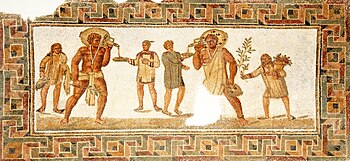
| Part of a series on |
| Forced labour and slavery |
|---|
 |
Slavery in ancient Rome played an important role in society and the economy. Unskilled or low-skill slaves labored in the fields, mines, and mills with few opportunities for advancement and little chance of freedom. Skilled and educated slaves—including artisans, chefs, domestic staff and personal attendants, entertainers, business managers, accountants and bankers, educators at all levels, secretaries and librarians, civil servants, and physicians—occupied a more privileged tier of servitude and could hope to obtain freedom through one of several well-defined paths with protections under the law. The possibility of manumission and subsequent citizenship was a distinguishing feature of Rome's system of slavery, resulting in a significant and influential number of freedpersons in Roman society.
At all levels of employment, free working people, former slaves, and the enslaved mostly did the same kinds of jobs. Elite Romans whose wealth came from property ownership saw little difference between slavery and a dependence on earning wages from labor. Slaves were themselves considered property under Roman law and had no rights of legal personhood. Unlike Roman citizens, by law they could be subjected to corporal punishment, sexual exploitation, torture, and summary execution. The most brutal forms of punishment were reserved for slaves. The adequacy of their diet, shelter, clothing, and healthcare was dependent on their perceived utility to owners whose impulses might be cruel or situationally humane.
Some people were born into slavery as the child of an enslaved mother. Others became slaves. War captives were considered legally enslaved, and Roman military expansion during the Republican era was a major source of slaves. From the 2nd century BC through late antiquity, kidnapping and piracy put freeborn people all around the Mediterranean at risk of illegal enslavement, to which the children of poor families were especially vulnerable. Although a law was passed to ban debt slavery quite early in Rome's history, some people sold themselves into contractual slavery to escape poverty. The slave trade, lightly taxed and regulated, flourished in all reaches of the Roman Empire and across borders.
In antiquity, slavery was seen as the political consequence of one group dominating another, and people of any race, ethnicity, or place of origin might become slaves, including freeborn Romans. Slavery was practiced within all communities of the Roman Empire, including among Jews and Christians. Even modest households might expect to have two or three slaves.
A period of slave rebellions ended with the defeat of Spartacus in 71 BC; slave uprisings grew rare in the Imperial era, when individual escape was a more persistent form of resistance. Fugitive slave-hunting was the most concerted form of policing in the Roman Empire.
Moral discourse on slavery was concerned with the treatment of slaves, and abolitionist views were almost nonexistent. Inscriptions set up by slaves and freedpersons and the art and decoration of their houses offer glimpses of how they saw themselves. A few writers and philosophers of the Roman era were former slaves or the sons of freed slaves. Some scholars have made efforts to imagine more deeply the lived experiences of slaves in the Roman world through comparisons to the Atlantic slave trade, but no portrait of the "typical" Roman slave emerges from the wide range of work performed by slaves and freedmen and the complex distinctions among their social and legal statuses.
- ^ Aliza Steinberg, Weaving in Stones: Garments and Their Accessories in the Mosaic Art of Eretz Israel in Late Antiquity (Archaeopress 2020), p. 97, noting the decorated tunics (tunicae manicatae) of the two free men being served.
- ^ Described by Mikhail Rostovtzev, The Social and Economic History of the Roman Empire (Tannen, 1900), p. 288.